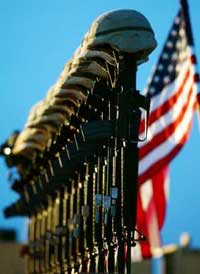|
US death toll in Iraq rises to 2,001
(AP)
Updated: 2005-10-26 20:56

A row of U.S. Army
helmets are perched on M-16 rifles during a memorial at Al Asad air base
for the 15 victims of a Chinook helicopter which was shot down by
insurgents in this November 6, 2003 file photo. As the U.S. military death
toll in Iraq reached 2,000, U.S. President George W. Bush said on October
25, 2005 that the war will require more time and sacrifice and rejected
calls for a U.S. pullout. [Reuters] | An
Associated Press count of war-related Iraqi deaths from the time Iraq's elected
government took office on April 28 through Tuesday found at least 3,870 Iraqi
deaths in that period alone. More than two-thirds were civilians while the rest
were Iraqi security personnel.
"I hope the number of Americans who die goes even higher," said Omar Ahmed,
36, the Sunni Arab owner of an electricity shop in Dora, one of the most violent
parts of Baghdad.
Nearby, Ali al-Obeidi, a 28-year-old Sunni Arab, said he hoped the U.S.
losses would prompt the United States to leave Iraq.
"It makes me happy," he said about the grim 2,000 dead soldiers milestone.
"They're an occupation force."
Al-Obeidi said the number pales in comparison to the thousands of dead
Iraqis. "The Iraqis are my brothers. We saw nothing good from the Americans.
They hurt us and their presence in Iraq is to blame for all the Iraqi deaths."
Such feelings are not shared by many of Iraq's majority Shiites, who were
freed from the oppression and discrimination that they suffered under Saddam.
"Remnants of Saddam's regime are cooperating with al-Qaida in Iraq. And this,
the killing of the Americans, will affect the stability and rebuilding of Iraq,"
said Hamid al-Sumaysim, 54, a Shiite shop owner in the Shiite holy city of
Najaf. "The Americans liberated us and they will help us to rebuild our
country."
Abdul Jabar Hassan, 48, a Shiite government electricity worker in the
southern city of Basra, said the growing U.S. death toll could be the result of
poor planning by the Bush administration about rebuilding Iraq after the war.
"I'm not surprised by this number," he said. "I expect it to go even higher
because America did not plan for the postwar situation in Iraq or really
understand its people."
Meanwhile, an Internet statement posted on an extreme Islamist Web site
Tuesday claimed that Al-Qaida in Iraq had abducted two Moroccan Embassy
employees in Baghdad. No demands were made in the statement and its authenticity
could not be verified.
On Monday, the Moroccan Foreign Ministry said embassy driver Abderrahim
Boualam and employee Abdelkrim el Mouhafidi disappeared Thursday after driving
back from Jordan, where they had gone to pick up their paychecks.
Al-Qaida in Iraq has claimed responsibility for executing numerous hostages,
including diplomats from Egypt and Algeria.
|